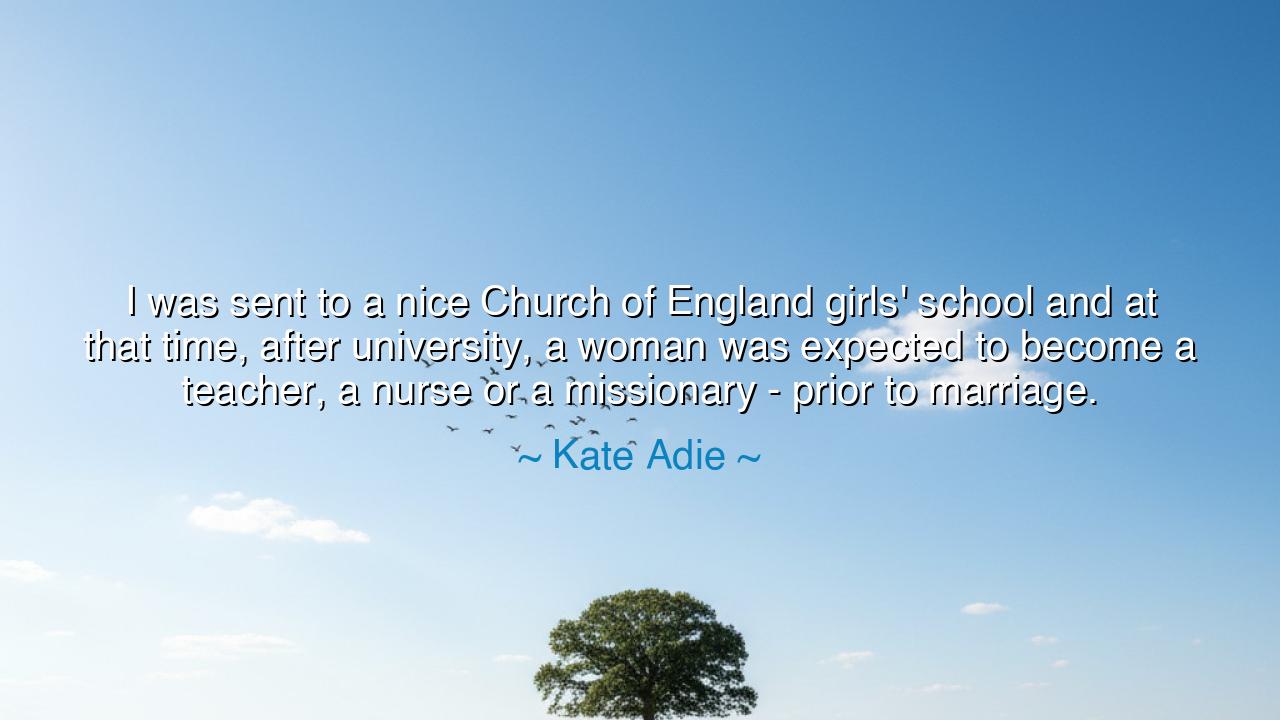
I was sent to a nice Church of England girls' school and at that
I was sent to a nice Church of England girls' school and at that time, after university, a woman was expected to become a teacher, a nurse or a missionary - prior to marriage.






“I was sent to a nice Church of England girls’ school and at that time, after university, a woman was expected to become a teacher, a nurse or a missionary — prior to marriage.” — Thus spoke Kate Adie, a woman who defied the narrow road set before her and carved a path through the world with courage and conviction. Her words, quiet in tone yet mighty in meaning, reveal not just her own story, but the story of generations — of women bound by expectation, confined by tradition, and yet, in time, rising to freedom. In her reflection lies the echo of an age not so far gone, when even the educated woman was not seen as a soul with infinite potential, but as a vessel of duty, decorum, and domesticity.
To understand this quote, one must first see the world into which Adie was born. It was a time of polished restraint, when even privilege carried chains of its own. In post-war Britain, education for women was encouraged, but independence was not. The Church of England schools taught morality, diligence, and grace — virtues noble in themselves, yet too often shaped by the belief that a woman’s highest calling was to serve, not to lead. To be a teacher, a nurse, or a missionary was honorable indeed, but to aspire beyond that — to adventure, to ambition, to authorship — was to step beyond the bounds of propriety. The world did not forbid women to dream; it merely taught them to dream smaller.
Yet it is precisely from such constraint that greatness often arises. Kate Adie, who would go on to become one of the most respected war correspondents of her generation, speaks these words not in bitterness, but as testimony — a remembrance of how far the spirit must travel to find its own destiny. She was told that marriage was her inevitable ending, that work was only a waiting room for the altar. But she chose otherwise. She chose the field over the drawing room, the battlefield over the parlor. She ran toward the smoke of conflict, not away from it, and brought truth to millions through her voice. In her defiance lies the eternal struggle of humanity: the battle between who we are told to be and who we are meant to become.
Her story calls to mind the ancient example of Hypatia of Alexandria, the philosopher and scientist who lived when the world still trembled between reason and superstition. She, too, was a woman born into a time that sought to limit her, yet she became the greatest mind of her city — teaching men who had once believed women unfit for thought. Like Adie, Hypatia shattered expectation, proving that intellect and courage know no gender. Across centuries, their stories converge — women who stepped beyond the sanctioned roles of teacher, nurse, or missionary, and instead became missionaries of truth itself.
Adie’s mention of marriage as the expected conclusion of a woman’s journey speaks to a deeper truth: that society has long measured a woman’s worth by her connection to others, not by her connection to herself. Yet marriage, noble when freely chosen, becomes hollow when it is prescribed. For the ancients knew — and we must remember — that a fulfilled life cannot be built upon duty alone. The soul yearns for purpose. When a woman’s dreams are caged, the whole of civilization loses something of its light. Adie’s generation, standing at the threshold between tradition and transformation, began to open that cage — and through their courage, countless others learned to fly.
But even now, her words are a reminder that freedom, once won, must be guarded. For expectation still whispers in subtler tones. It tells the young woman today what she should look like, what she should study, how she should live — not in the language of religion or etiquette, but in the language of comparison and conformity. The struggle for self-definition, which Adie faced openly, has not ended; it has merely changed its disguise. To live fully, one must listen not to the chorus of expectation, but to the still, clear voice of truth within.
And so, dear listener, let this story guide you. Do not let the world’s narrow vision confine your boundless spirit. Respect the traditions that shaped you, but never let them dictate your destiny. Like Kate Adie, choose courage over conformity, curiosity over comfort. Whether you are a woman or man, young or old, your calling is not to fit into a pattern, but to create your own. The world honors those who serve, but it remembers those who transform.
Thus, let this lesson endure: every generation inherits limits, and every brave soul must push beyond them. Kate Adie reminds us that expectation may shape us, but it does not define us. To live truly — to live nobly — is to follow the path of one’s own purpose, even when that path has never been walked before.






AAdministratorAdministrator
Welcome, honored guests. Please leave a comment, we will respond soon